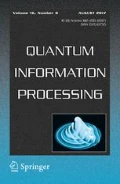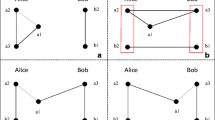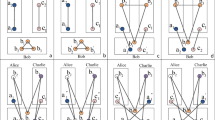Abstract
Quantum key agreement protocol is a key establishment technique whereby a classical shared secret key is derived by two or more specified parties equally and fairly based on quantum mechanics principles. In this paper, we presented two novel quantum key agreement protocols for two parties and more parties based on entanglement swapping. The proposed protocols utilize Bell states as the quantum resources, and further perform Bell measurements as the main operations. In addition, they don’t require the help of a trusted center or third party, but could ensure fairness, security and efficiency.
Similar content being viewed by others
References
Diffie W., Hellman M.: New directions in cryptography. IEEE Trans. Inf. Theory 22, 644–654 (1976)
Ingemarsson I., Tang D.T., Wong C.K.: A conference key distribution system. IEEE Trans. Inf. Theory 28, 714–719 (1982)
Burmester, M., Desmedt, Y.: A secure and efficient conference key distribution system. In: Advances in Cryptology—EUROCRYPT 1994, Lecture Notes in Computer Science, vol. 950, pp. 275–286 (1994)
Steiner M., Tsudik G., Waidner M.: Key agreement in dynamic peer groups. IEEE Trans. Parallel Distrib. Syst. 11, 769–780 (2000)
Shor, P.W.: Algorithms for quantum computation: Discrete logarithms and factoring. In: Proceedings of 35th Annual Symposium on Foundations of Computer Science, pp. 124–134. Los Alamitos (1994)
Grover, L.K.: A fast quantum mechanical algorithm for database search. In Proceedings of 28th Annual ACM Symposium on the Theory of Computing, pp. 212–219. Philadelphia (1996)
Zhou N., Zeng G., Xiong J.: Quantum key agreement protocol. Electron. Lett. 40, 1149 (2004)
Tsai, C.W., Hwang, T.: On quantum key agreement protocol. Technical Report C-S-I-E, NCKU, Taiwan (2009)
Chong S.K., Hwang T.: Quantum key agreement protocol based on BB84. Opt. Commun. 283, 1192–1195 (2010)
Bennett, C.H., Brassard, G.: Quantum cryptography: public key distribution and coin tossing. In: Proceedings of IEEE International Conference on 290 Computers, Systems and Signal Processing, pp. 175–179. IEEE, Bangalore (1984)
Wang T.Y., Wen Q.Y., Chen X.B. et al.: An efficient and secure multiparty quantum secret sharing scheme based on single photons. Opt. Commun. 281, 6130–6134 (2008)
Sun Y., Wen Q.Y., Gao F. et al.: Multiparty quantum secret sharing based on Bell measurement. Opt. Commun. 282, 3647–3651 (2009)
Shi R.H., Zhong H.: Multiparty quantum secret sharing with the pure entangled two-photon states. Quantum Inf. Process. 11, 161–169 (2012)
Shi R.H., Huang L.S., Yang W., Zhong H.: Multi-party quantum state sharing of an arbitrary two-qubit state with Bell states. Quantum Inf. Process. 10, 231–239 (2011)
Shi R.H., Huang L.S., Yang W., Zhong H.: Asymmetric multi-party quantum state sharing of an arbitrary m-qubit state. Quantum Inf. Process. 10, 53–61 (2011)
Gao F., Qin S.J., Wen Q.Y., Zhu F.C.: A simple participant attack on the Bradler-Dusek protocol. Quantum Inf. Comput. 7, 329–334 (2007)
Qin S.J., Gao F., Wen Q.Y., Zhu F.C.: Cryptanalysis of the Hillery-Buzek-Berthiaume quantum secret-sharing protocol. Phys. Rev. A 76, 062324 (2007)
Lin S. et al.: Comment on multiparty quantum secret sharing of classical messages based on entanglement swapping. Phys. Rev. A 76, 036301 (2007)
Lin S. et al.: Improving the security of multiparty quantum secret sharing based on the improved Bostrom-Felbinger protocol. Opt. Commun. 281, 4553–4554 (2008)
Gao F. et al.: Comment on experimental demonstration of a quantum protocol for byzantine agreement and liar detection. Phys. Rev. Lett. 101, 208901 (2008)
Song T. et al.: Participant attack on quantum secret sharing based on entanglement swapping. Chin. Phys. B 18, 1333–1337 (2009)
Guo F.Z. et al.: Participant attack on a kind of MQSS schemes based on entanglement swapping. Eur. Phys. J. D 56, 445–448 (2010)
Wang T.Y. et al.: Cryptanalysis and improvement of multiparty quantum secret sharing schemes. Phys. Lett. A 373, 65–68 (2008)
Author information
Authors and Affiliations
Corresponding author
Rights and permissions
About this article
Cite this article
Shi, RH., Zhong, H. Multi-party quantum key agreement with bell states and bell measurements. Quantum Inf Process 12, 921–932 (2013). https://doi.org/10.1007/s11128-012-0443-2
Received:
Accepted:
Published:
Issue Date:
DOI: https://doi.org/10.1007/s11128-012-0443-2




